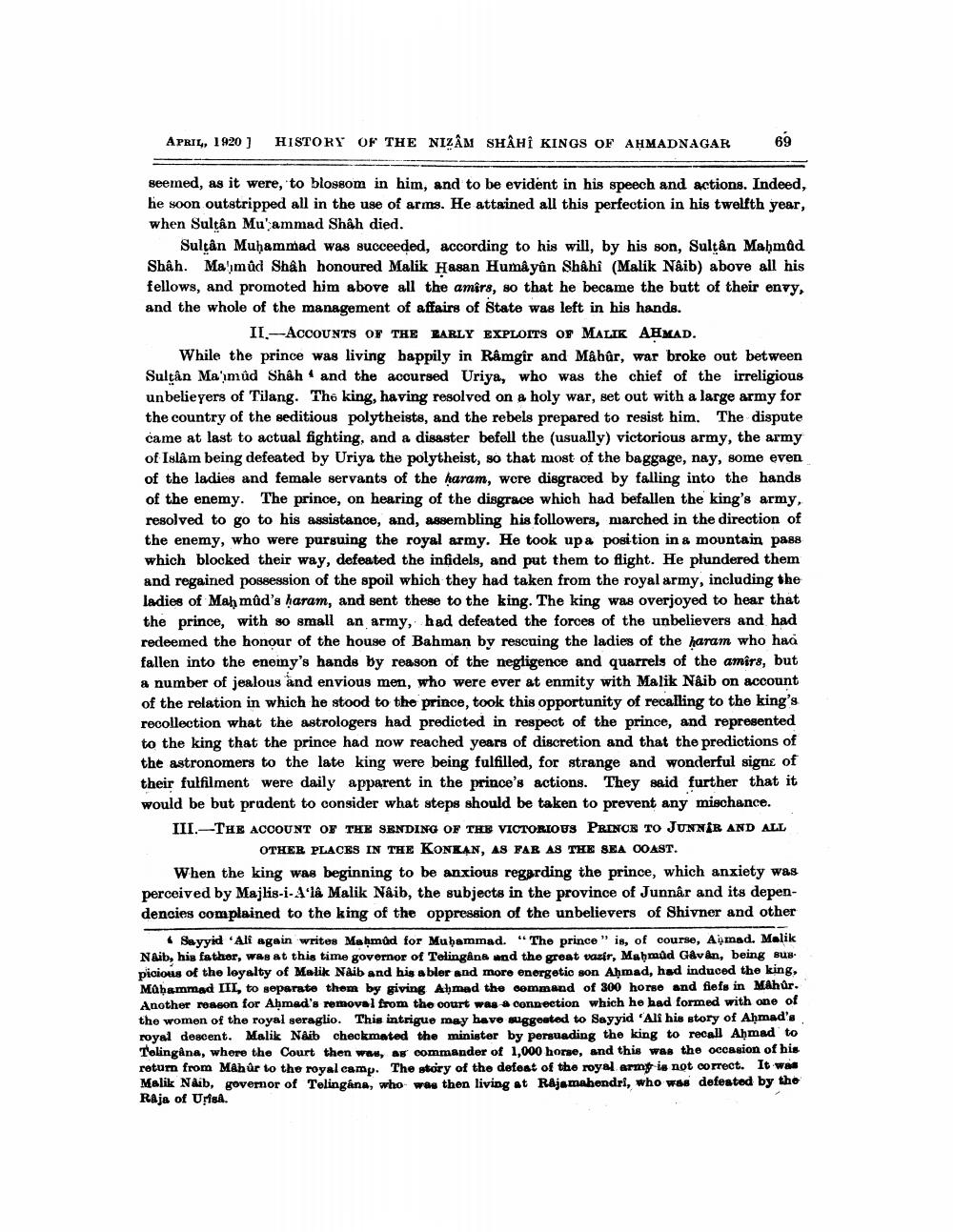________________
APRIL, 1920] HISTORY OF THE NIZAM SHAHI KINGS OF AHMADNAGAR
seemed, as it were, to blossom in him, and to be evident in his speech and actions. Indeed, he soon outstripped all in the use of arms. He attained all this perfection in his twelfth year, when Sultan Mu'ammad Shah died.
69
Sultan Muhammad was succeeded, according to his will, by his son, Sultan Mahmûd Shah. Mahmûd Shâh honoured Malik Hasan Humâyûn Shâhî (Malik Nâib) above all his fellows, and promoted him above all the amirs, so that he became the butt of their envy, and the whole of the management of affairs of State was left in his hands.
II-ACCOUNTS OF THE EARLY EXPLOITS OF MALIK AḤMAD.
While the prince was living happily in Râmgîr and Mâhûr, war broke out between Sultan Mahmud Shah and the accursed Uriya, who was the chief of the irreligious unbelievers of Tilang. The king, having resolved on a holy war, set out with a large army for the country of the seditious polytheists, and the rebels prepared to resist him. The dispute came at last to actual fighting, and a disaster befell the (usually) victorious army, the army of Islâm being defeated by Uriya the polytheist, so that most of the baggage, nay, some even of the ladies and female servants of the haram, were disgraced by falling into the hands of the enemy. The prince, on hearing of the disgrace which had befallen the king's army, resolved to go to his assistance, and, assembling his followers, marched in the direction of the enemy, who were pursuing the royal army. He took up a position in a mountain pass which blocked their way, defeated the infidels, and put them to flight. He plundered them and regained possession of the spoil which they had taken from the royal army, including the ladies of Mahmûd's haram, and sent these to the king. The king was overjoyed to hear that the prince, with so small an army, had defeated the forces of the unbelievers and had redeemed the honour of the house of Bahman by rescuing the ladies of the haram who had fallen into the enemy's hands by reason of the negligence and quarrels of the amirs, but a number of jealous and envious men, who were ever at enmity with Malik Nâib on account of the relation in which he stood to the prince, took this opportunity of recalling to the king's recollection what the astrologers had predicted in respect of the prince, and represented to the king that the prince had now reached years of discretion and that the predictions of the astronomers to the late king were being fulfilled, for strange and wonderful signɛ of their fulfilment were daily apparent in the prince's actions. They said further that it would be but prudent to consider what steps should be taken to prevent any mischance.
III. THE ACCOUNT OF THE SENDING OF THE VICTORIOUS PRINCE TO JUNNIR AND ALL OTHER PLACES IN THE KONKAN, AS FAR AS THE SEA COAST.
When the king was beginning to be anxious regarding the prince, which anxiety was perceived by Majlis-i-A'la Malik Nâib, the subjects in the province of Junnâr and its dependencies complained to the king of the oppression of the unbelievers of Shivner and other
Sayyid 'Ali again writes Mahmûd for Muhammad. "The prince" is, of course, Amad. Malik Naib, his father, was at this time governor of Telingane and the great vazir, Mahmûd Gâvân, being sus picious of the loyalty of Malik Naib and his abler and more energetic son Ahmad, had induced the king, Müḥammad III, to separate them by giving Ahmad the command of 300 horse and fiefs in Mahûr. Another reason for Ahmad's removal from the court was a connection which he had formed with one of the women of the royal seraglio. This intrigue may have suggested to Sayyid Ali his story of Ahmad's royal descent. Malik Naib checkmated the minister by persuading the king to recall Aḥmad to Telingana, where the Court then was, as commander of 1,000 horse, and this was the occasion of his return from Mahûr to the royal camp. The story of the defeat of the royal army is not correct. It was Malik Naib, governor of Telingana, who was then living at Rajamahendri, who was defeated by the Raja of Urisa.




